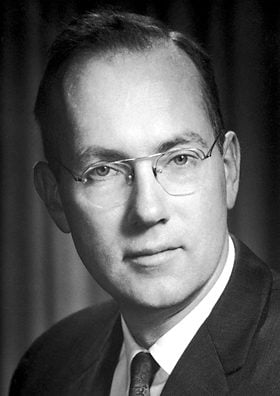
A 1964 photograph taken by Roy Kaltschmidt for the Nobel Foundation
“At least this is the way I see it. I am a physicist. I also consider myself a Christian. As I try to understand the nature of our universe in these two modes of thinking, I see many commonalities and crossovers between science and religion. It seems logical that in the long run the two will even converge.”
“Many have a feeling that somehow intelligence must have been involved in the laws of the universe.”
“I strongly believe in the existence of God, based on intuition, observations, logic, and also scientific knowledge.”
“Science has faith. We make postulates. We can’t prove those postulates, but we have faith in them.”
Charles H. Townes (Nobel Prize in Physics, 1964)
Dr. Townes believed that “science and religion [are] quite parallel, much more similar than most people think and that in the long run, they must converge.” “Science,” he wrote, “tries to understand what our universe is like and how it works, including us humans. Religion is aimed at understanding the purpose and meaning of our universe, including our own lives. If the universe has a purpose or meaning, this must be reflected in its structure and functioning, and hence in science.”
“He was one of the most important experimental physicists of the last century,” Dr. Reinhard Genzel, a professor of physics at the University of California at Berkeley, remarked upon the death of Dr. Townes. “His strength was his curiosity and his unshakable optimism, based on his deep Christian spirituality.”












